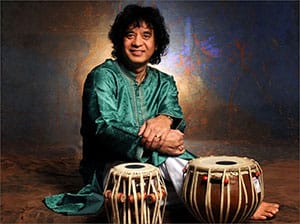Maestro Zakir Hussain Died at the age of 73.
Tabla maestro zakir hussain died in hospital in San Francisco at the age of 73
Zakir Hussain , a name synonymous with the tabla, is one of the most distinguished and celebrated percussionists in the world. Born on March 9, 1951, in Mumbai, India, to a musical family, Zakir’s journey into the world of classical music and tabla started early. His father, the legendary tabla maestro Ustad Alla Rakha, was a prominent figure in Indian classical music, and it was under his tutelage that Zakir began his musical education. From a tender age, Zakir showed an exceptional ability and deep connection to the rhythm, something that was evident to those around him.
Zakir Hussain’s early Life
Zakir Hussain’s early training in tabla was rigorous, and he learned not only the intricate technicalities of playing the instrument but also the nuances of its expressive potential. His early years were marked by constant practice and exposure to the classical music tradition. Under the guidance of his father and other renowned musicians, he honed his skills and developed a deep understanding of Hindustani classical music.
His musical journey took a defining turn when he began performing at the age of 12, and by 14, he was already performing professionally, playing alongside some of the finest musicians of the time. Zakir’s ability to blend traditional tabla rhythms with innovative and experimental approaches set him apart from his contemporaries. His performances exude a deep understanding of rhythm, precision, and emotion, captivating audiences worldwide.
One of the defining features of Zakir Hussain’s career has been his ability to fuse Indian classical music with global sounds. His collaborations with jazz, Western classical musicians, and artists from various genres have brought him international acclaim. His partnership with the late jazz legend, John McLaughlin, in the group Shakti, is one of the most celebrated instances of cross-cultural musical collaboration. Through Shakti, Zakir Hussain explored new musical territories, blending Indian classical ragas with jazz improvisations, creating a groundbreaking fusion of styles that still resonates with music lovers today.
Apart from Shakti, Zakir has collaborated with a wide array of musicians, from the iconic Ravi Shankar to the modern virtuoso Bela Fleck. His ability to adapt to different musical forms while retaining the integrity of the tabla’s tradition has made him a sought-after performer and collaborator. His versatility is evident not just in his solo performances but also in his work with orchestras and global artists.
Zakir Hussain’s contribution to music extends beyond performance. He is a respected educator who has taught at various institutions worldwide, helping to cultivate a new generation of tabla players. He has received numerous accolades for his contributions to music, including the prestigious Padma Bhushan, one of India’s highest civilian honors, in 2002.
Zakir’s influence as a cultural ambassador for Indian classical music is profound. His performances are not just musical exhibitions but a reflection of his deep understanding of the human connection to rhythm and sound. His mastery of tabla is an embodiment of dedication, discipline, and an unyielding commitment to artistic excellence. Through his music, Zakir Hussain has not only preserved the rich tradition of tabla playing but has also introduced it to global audiences, elevating the instrument to new heights.
As one of the leading figures in the global music scene, Zakir Hussain’s legacy as a tabla maestro, composer, and innovator continues to inspire musicians and music lovers alike. His life and work have transcended borders and cultures, making him a true ambassador of India’s musical heritage on the global stage. Zakir Hussain really was such a master musician to be remember.
Also Visit-
The Future of Artificial Intelligence: Opportunities and Challenges
How to Help Marine Life Thrive: A Comprehensive Guide to Protecting Ocean Animals
